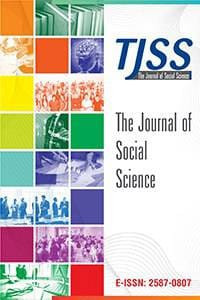Komplo teorisi inancı ve eğitimi: Eleştirel bir sosyal analiz
komplo teorileri, eleştirel sosyal teori, eğitim, diyalektik materyalizm
Conspiracy Theory Belief and Education: A Critical Social Analysis
Conspiracy theories, education critical thinking, critical social theory, critical pedagogy, dialectical materialism,
___
- Baron, R. M. & Kenny, D. A. (1986). The moderator-mediator variable distinction in social psychological research: Conceptual, strategic and statistical considerations. Journal of Personality and Social Psychology, 51(1), 1173-1182.
- Boronski, T. (2022). Critical pedagogy: An exploration of contemporary themes and issues. Routledge.
- Bronner, S. E. (2011). Critical theory: A very short introduction. Oxford University Press.
- Chatterjee, I., & Ahmed, W. (2019). Dialectical Materialism. ACME: An International Journal for Critical Geographies, 18(2), 364-393.
- Crocker, J., Luhtanen, R., Broadnax, S. & Blaine, B. E. (1999). Belief in U.S. government conspiracies against blacks among black and white college students: Powerlessness or System Blame? Personality and Social Psychology Bulletin, 25(8), 941–953. doi: 10.1177/01461672992511003
- Davis, J., Wetherell, G. & Henry, P. J. (2018). Social devaluation of African Americans and race-related conspiracy theories. European Journal of Social Psychology, 48(7), 999-1010. doi: 10.1002/ejsp.2531
- Douglas, K. M., Sutton, R. M., Callan, M. J., Dawtry, R. J. & Harvey, A. J. (2015). Someone is pulling the strings: Hypersensitive agency detection and belief in conspiracy theories. Thinking & Reasoning, 26(6), 1–21. doi: 10.1080/13546783.2015.1051586
- Douglas, K. M., Uscinski, J. E., Sutton, R. M., Cichocka, A., Nefes, T., Ang, C. S. & Deravi, F. (2019). Understanding conspiracy theories. Political Psychology, 40(S1), 3–35. doi: 10.1111/pops.12568.
- Galliford, N. & Furnham, A. (2017). Individual difference factors and beliefs in medical and political conspiracy theories. Scandinavian Journal of Psychology, 58(5), 422-428. doi: 10.1111/sjop.12382
- Geuss, R. (1981). The idea of critical theory: Habermas and the Frankfurt school. Cambridge University Press.
- Giroux, H. A. (2003). Racial injustice and disposable youth in the age of zero tolerance. International Journal of Qualitative Studies in Education, 16(4), 553–565. doi: 10.1080/0951839032000099543
- Giroux, H. A. (2021). On critical pedagogy, 2nd edition. London: Bloomsbury Academic.
- Goertzel, T. (1994). Belief in Conspiracy Theories. Political Psychology, 15(4), 731.doi: 10.2307/3791630
- Heins, V. (2007). Critical theory and the traps of conspiracy thinking. Philosophy & Social Criticism, 33(7), 787–801. doi: 10.1177/0191453707081675
- Hill, D., Skordoulis, K. & Rasinski, L. (2019). Introduction. In: Rasinski, L., Hill, D. & Skordoulis, K. (eds.) Marxism and education: International perspectives on theory and action (pp. 1-8). Routledge.
- Lantian, A., Bagneux, V., Delouvée, S., & Gauvrit, N. (2021). Maybe a free thinker but not a critical one: High conspiracy belief is associated with low critical thinking ability. Applied Cognitive Psychology, 35(3), 674–684. doi: 10.1002/acp.3790
- McLaren, P. (2016). A look at the major concepts, in Pruyn, M. Huerta-Charles, L (eds.) The fist called my heart: The Peter McLaren reader, volume 1 (pp. 27-66). Information Age Publishing.
- OECD (2021). Programme for International Student Assessment data [online]. https://www.oecd.org/pisa/data/
- OECD (2022). Transformative Competencies for 2030 [online]. https://www.oecd.org/education/2030-project/teaching-and-learning/learning/transformative-competencies/in_brief_Transformative_Competencies.pdf
- Popkova, E. G., & Tinyakova, V. I. (2013). Dialectical methodology of analysis of economic growth. World Applied Sciences Journal, 24(4), 467-475. doi: 10.5829/idosi.wasj.2013.24.04.13189
- Reay, D. (2012). What would a socially just education system look like? Saving the minnows from the pike. Journal of Education Policy, 27(5), 42-63. doi: 10.1080/02680939.2012.710015
- Sutton, R. M. & Douglas, K. M. (2020). Conspiracy theories and the conspiracy mindset: implications for political ideology. Current Opinion in Behavioral Sciences, 34, 118–122. doi: 10.1016/j.cobeha.2020.02.015
- Swami, V., Voracek, M., Stieger, S., Tran, U. S. & Furnham, A. (2014). Analytic thinking reduces belief in conspiracy theories. Cognition, 133(3), 572–585. doi: 10.1016/j.cognition.2014.08.0
- Thalheimer, A. (1927). Introduction to dialectical materialism: The Marxist worldview. Covici Friede.
- Transparency International (2021). Corruption Perceptions Index methodology [online]. https://images.transparencycdn.org/images/2020-Methodology_v3.zip
- Uscinski, J. E. (2018). Conspiracy theories and the people who believe in them. Oxford Scholarship Online. https://oxford.universitypressscholarship.com/view/10.1093/oso/9780190844073.001.0001/oso-9780190844073
- van Prooijen, J. W. (2017). Why education predicts decreased belief in conspiracy theories. Applied Cognitive Psychology, 31(17), 50-58.
- van Prooijen, J. W., Krouwel, A. P. M. & Pollet, T. (2015). Political extremism predicts belief in conspiracy theories. Social Psychological and Personality Science, 6(5), 570–578. doi: 10.1177/1948550614567356
- White, J. D. (1996). Karl Marx and the intellectual origins of dialectical materialism. Macmillan.
- World Bank (2021). The World Bank data: All indicators [online]. https://data.worldbank.org/indicator?tab=all
- YouGov (2021). YouGov Cambridge globalism study [online]. https://docs.cdn.yougov.com/2ouu9vfd10/YouGov%20-%20Globalism%20Study%20and%20conspiracies%20Results.pdf
- Zembylas, M. (2021). Moving beyond debunking conspiracy theories from a narrow epistemic lens: ethical and political implications for education. Pedagogy, Culture & Society, 1–16. doi: 10.1080/14681366.2021.1948911
- Yayın Aralığı: Yılda 2 Sayı
- Başlangıç: 2017
- Yayıncı: Cenk AKSOY
Child Poverty Indicators: The Case of Elazig
Pelın KILINÇ, Merve Sefa YILMAZ
Alternatif Türk Haber Siteleri Web Sayfalarında Aşı Karşıtlığı Söylemi Analizi
Selva ERSÖZ, Emel DEMİR ASKEROĞLU
Hellenistik Dönem Çıplak Aphrodite Heykellerinin Oluşumu Üzerine Toplumsal Etki
Benefits Of Using Information Technology In Supply Chain Management
University Students’ Classification of Factors Affecting Their Well-Being and Psychological Distress
Konabe BENE, Sofia ADAN, Maïmounata Marie Beatrice KERE
Komplo teorisi inancı ve eğitimi: Eleştirel bir sosyal analiz
Sayed Mohammad Zarif ABDALİ, Ahmad Robin SEDEQİ, Sayed Ahmad Edriss HOSSİNİ, Mohammad Haroon QİAMİ
